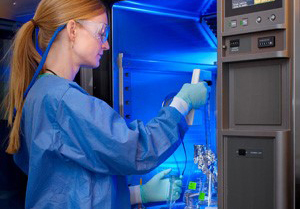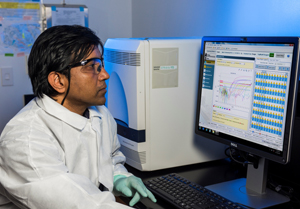Water, Sanitation, and Hygiene Laboratories
The lead laboratory units for domestic water, sanitation, and hygiene (WASH)-related diseases associated with community settings and the natural environment in CDC’s National Center for Emerging and Zoonotic Infectious Diseases.
Our Environmental Microbiology and Engineering Laboratory Team and Clinical Detection and Surveillance Laboratory Team conduct:
- Diagnostics for free-living ameba infections
- Water-related outbreak investigations
- Molecular surveillance for Giardia and Cryptosporidium
- Water disinfection research
The teams also work with laboratories, subject matter experts, and programs around CDC.
Environmental Microbiology and Engineering Laboratory Team


Mission: Developing and applying methods for environmental sampling, microbial detection, and treatment technologies to prevent WASH-related disease.
Our laboratories:
- Support water-related emergency preparedness and outbreak investigations domestically
- Conduct environmental sampling and testing of water, wastewater, soil, sediment, biosolids, filters, and other environmental sample types
- Quantify and/or detect viruses, bacteria, and parasites in environmental samples using culture, molecular, and microscopy methods
- Develop and optimize environmental sample collection and microbial detection and characterization methods
- Conduct environmental investigations to identify pathogens and indicators of fecal contamination
- Develop and implement approaches for detection and quantification of antibiotic resistance in the environment
- Conduct primary research on the fate, transport, and disinfection mechanisms of waterborne pathogens in environmental systems
- Assess disinfection and treatment methods for drinking water and recreational water
- Provide tools for environmental microbiology laboratory capacity building and training on environmental sampling techniques and associated analytical methods
Environmental Microbiology and Engineering Laboratory Team Highlights
Clinical Detection and Surveillance Laboratory Team


Mission: Developing and applying advanced molecular and cellular parasitology methods for clinical diagnostics, surveillance, and outbreak investigations to prevent WASH-related diseases.
Our laboratories:
- Investigate the molecular and genomic epidemiology of waterborne and zoonotic parasites in humans and animals in the context of One Health
- Molecularly subtype waterborne and foodborne protozoan pathogens (Cryptosporidium, Giardia, Naegleria fowleri, E. histolytica) in clinical, animal, and environmental samples
- Develop novel molecular methods for diagnosing, characterizing, and differentiating predominantly waterborne parasites
- Track sources and spread of protozoan parasites using advanced molecular detection tools, such as whole genome sequencing (WGS)
- Diagnose amebic infections, including pathogenic free-living Acanthamoeba spp., Balamuthia mandrillaris, and Naegleria fowleri
- Develop and manage CryptoNet, CDC’s first molecular surveillance system for a parasite–a DNA sequence-based system for understanding U.S. transmission of cryptosporidiosis
- Study waterborne parasite biology and Cryptosporidium oocyst production
Clinical Detection and Surveillance Laboratory Team Highlights